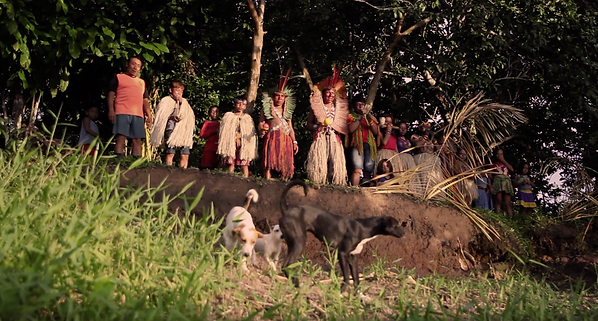RESTORATIVE PROJECTS
The Huni Kuin Sustainable Community Master Plan
The Huni Kuin "True people" are often referred to as the last guardians of the Amazon rainforest. They have lived in ecological harmony with nature for thousands of years; Their culture, history, and entire existence depend on it.
They are to this day, the largest indigenous population of the Brazilian state of Acre and are estimated to 11 000 people, currently living in 108 villages on twelve Indigenous reservations along seven different rivers, including the Purus, Envira, Murú, Humaitá, Tarauacá, Breu and Jordão. The Huni Kuin play a key role in the protection of uncontacted tribes as they occupy and defend the territories where resides some of the last uncontacted tribes in the world.
The Huni Kuin had relatively late contact with the world. At the end of the 19th century from 1890 onwards, a wave of invasions by rubber extractors began. During this period of violent contact, invaders systematically attacked the local indigenous groups and the Huni Kuin were enslaved, forbidden from speaking their language and practice their spirituality. Despite years of persecution, the Huni Kuin’s beautiful ancestral traditions were kept alive by the elders and are today practiced joyfully throughout their 108 villages.
The Huni Kuin Sustainable Community Master Plan is a holistic vision for the future that honors the traditions and way of life of the Huni Kuin people while responding to the needs and challenges they are facing with low tech, low cost, and zero waste to low impact solutions. This Master Plan’s main objective is to co-create with the Huni Kuin Federation a sustainable community model for the future with design guidelines and protective regulations that will be implemented in 12 pilot villages in the region of Carapna and serve as the sustainable community model for Huni Kuin villages. The Huni Kuin Sustainable Community Master Plan aims to ensure the restoration and long-term protection of the health and culture of the Huni Kuin people and the forest they protect. Improving population health by providing access to clean water and preserving the Huni Kuin culture and traditions are at the heart of this Master Plan.
As of today, the majority of the 108 Huni Kuin villages lack access to clean water and are seeing a rise in chronic illnesses such as stomach cancer, uterine cancer and auto-immunes disorders such as diabetes. The Huni Kuin also suffer from malnutrition, cholera, and mosquito-borne illnesses such as dengue and Malaria.
We conducted a baseline health assessment in several villages in the region of Carapana, and analyzing water access and quality, soil, diet, lifestyle, waste management, and the potential sources of contamination. In collaboration with the Huni Kuin Federation, we decided that the most effective solution to improve population health and reduce mortality was to provide access to clean water to all 108 Huni Kuin villages. We recently completed the construction of 15 solar powered wells for the region of Carapana and are in the process of planning and fundraising for the construction of 27 solar powered wells for the region of Jordao.





PROJECT PHASES
PHASE 1
-
Provide clean water to 12 pilot villages - Completed
-
Organize water education and waste management workshop with 12 health agents of the 12 pilot villages. - Completed
-
Smart Wifi internet network (3 villages) to enable communication for the region of Carapana (12 pilot villages) - Completed
-
Build sanitation facilities that will prevent soil contamination, improve population health.
PHASE 2
-
Two Houses of artisanship to support cultural preservation - 1 House completed.
-
One Spiritual and medical center to preserve traditional medical knowledge - In progress
-
One Recording Studio to preserve traditional sacred chants - In progress
PHASE 3
-
Natural water purification systems for streams, ponds, and cassimbas, such as floating gardens, seed and plants.
-
Permaculture: cultivate foods with high vitamin content to fight malnutrition, improve diet, and offer natural remedies to support population health in fighting emerging diseases.
-
Projects that support circular economy including coffee production and soap production - In Progress
This project is conducted in collaboration with and under the supervision of the Huni Kuin Federation. The Huni Kuin Federation and Mothers of the Amazon share the same mission is to protect the rainforest and preserve the Huni Kuin traditions.
